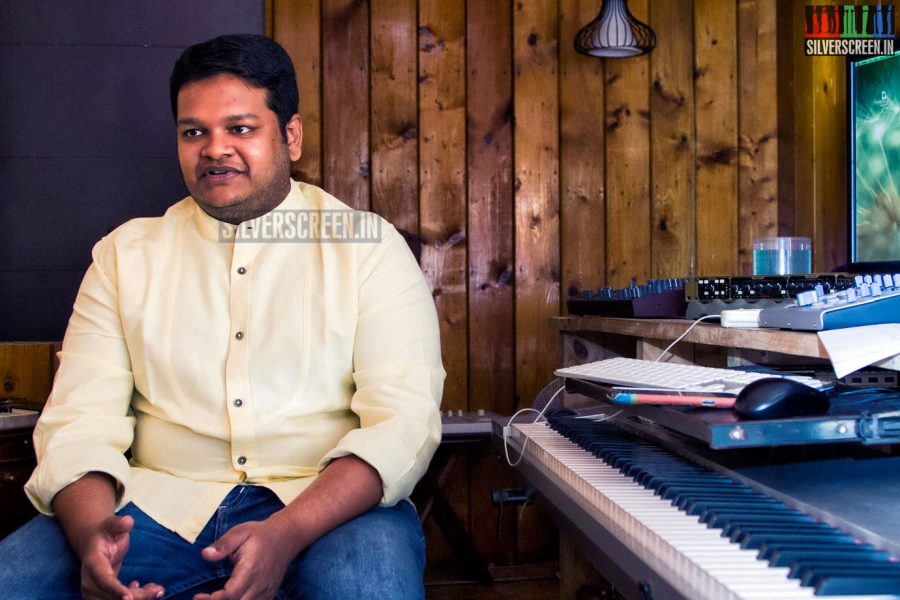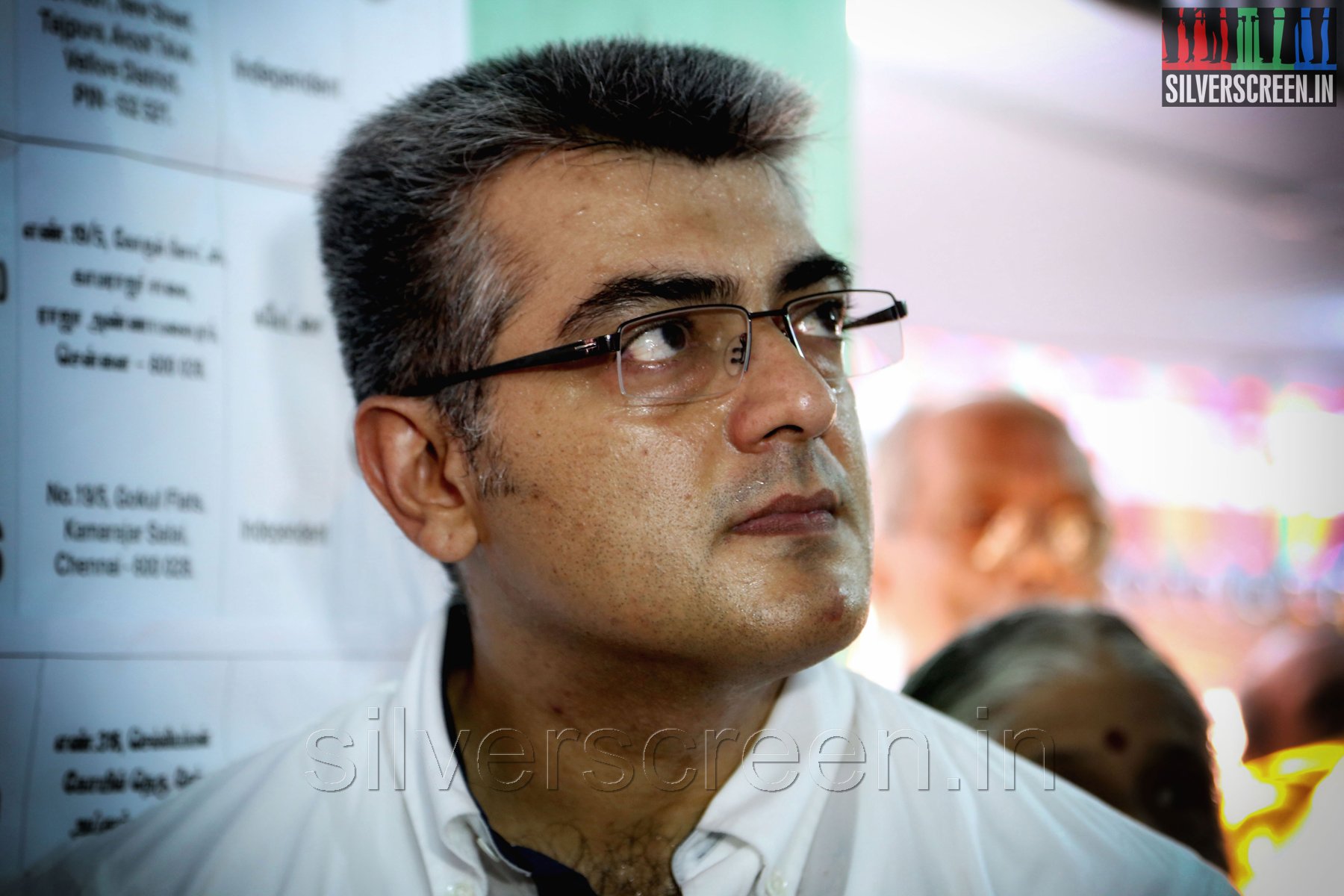Ghibran is meticulous about everything he does. A text message containing his address reads like that on a postcard. A slew of directions follows next. He also provides three landmarks.
Later, as we talk, he would often inquire, “do you understand?” and listen patiently as I paraphrased his answers for him, and nod when he was satisfied.
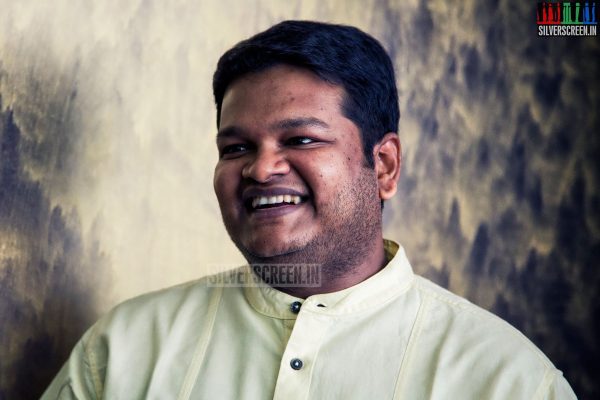
Music Director M Ghibran Exclusive HQ Photos for Silverscreen.in
A mosque situated near the studio is perhaps another thing of great significance to Ghibran. He often steps out for prayers, when not in his studio composing or listening to music.

Music Director M Ghibran Exclusive HQ Photos for Silverscreen.in
The photo-shoot leaves him nervous.
“Ukkaarra pose vendam…. nikkaren,” he tells our photographer.
We finish the shoot in 10 minutes, and get back to his studio. Ghibran becomes his usual self again.
The last few years have been very kind to Ghibran. His music has won critical acclaim. He has several important projects in his pipeline. And, the songs of his upcoming release, Amara Kaaviyam, are topping the charts. Ghibran believes that the movie would be a landmark in his career. The flick features four romantic numbers, and a peppy track. Ghibran says that’s a blessing. “Not everyone will get an opportunity like this. Amara Kaaviyam portrays different stages of love, and I could complement each stage with my music.” The background score of the film plays a pivotal role, too. “The movie can be interpreted in two ways: One, when you watch it with the BGM; two, when you mute it. The experience of composing for Amarakaaviyam has been overwhelming.”
Mounam Pesum is his favourite among the lot, he declares, but quickly follows it up with a disclaimer. “I like Mounam Pesum just 0.01% more than the other songs!” Also, he had always wanted to work with Chithra. “Time paathutey irundhen, to rope in Chithra amma. The film is set in 1989, so that worked in my favour.” Ghibran has a “technical reason” to love the song too. The impeccable piano rendition in the beginning and those classical guitar notes are what that satiate him as a composer. He’s a big fan of string instruments. “I loved working with Jeeva Sankar (director of Amara Kaaviyam). He can appreciate good music. Despite not knowing music-related terminology, he would tell me what he wanted, and let me explore too. If it had been some other filmmaker, the orchestration of string instruments would have sounded odd. Enna sir, keechu keechunu irruku nu kepaanga. But Jeeva Sankar knew where I was going.”
Ghibran reckons that Amara Kaaviyam will be commercially successful. So much so that he foresees an “after Amara Kaaviyam phase”. “The commercial success of a movie affects any creator. For instance, if I compose a song, and if it does well before the film’s release, it is forgotten when the flick fails. Film mela irukkum kovam paatu mela varum,” he explains sagely, “you know you have done your best, but it doesn’t get what it deserves because of someone else’s mistake.”
Ghibran doesn’t read reviews either. Comments on his music affect him on a personal level. He doesn’t think about an album after the audio launch.
When Sara Sara from Vaagai Sooda Vaa became popular, filmmakers wanted him to compose similar numbers. And after the release of Vathikuchi, he was bombarded with requests to make more songs like Kuru Kuru. “I don’t let that influence my music, though. I will do what the subject wants,” he declares with vehemence.
But if there’s something that Ghibran detests, it would be auto-tuning of the vocals. “I go out of my way to make the voice sound original. Not a big fan of playing with it.” He treats his lyrics with similar respect. He can easily recall lines from his songs. “I admire (lyricists) Karthik Netha and Parvathy,” he smiles, and recites a favourite line from the song Enthara (Thirumanam Enum Nikkah) penned by Karthik.
Thaneerai koosi kondu
Mella sellum bimbangal neeyaagirai
He hums it once again, before pulling out a line from Edhedho Ennum Vanthu (Amara Kaaviyam) written by Parvathy.
Despite having worked with several filmmakers, Ghibran shares a special rapport with Jeeva Sankar and Anees (director of Thirumanam Enum Nikkah). A director’s vision matters a lot, he says. “Trust between the director and the composer is important. Jeeva Sankar and Anees let me experiment, so the songs of Amara Kaaviyam and Thirumanam Ennum Nikkah sound different. Every project lasts for a year. We work like a husband and wife!”
****
Ghibran is quite religious too. A staunch believer, he attributes his music to his faith. It lets him compose in peace, he declares simply. “I don’t know whether I am a good musician, but I know I work hard. God has given me a job, I want to be truthful to him.”
He would also love to share a moment of that peace with the audience.
“Teddybear from Naiyaandi is a fun track. Through such light numbers, I want people to forget this world. Listening to such songs is like playing Mario. You simply have fun.”
Ghibran’s melodies are quite popular, too. Kannukkul Pothivaippen from Thirumanam Ennum Nikkah, being a case in point.
He likes to take it slow. That’s a principle he abides by. And it stems from a life-changing experience that occurred in 2005. He was watching TV, when his sound engineer, who had walked in at that moment, exclaimed that the ad running on the TV features Ghibran’s music. But the composer couldn’t recognize it.
Recommended
“‘Idhu namma panna ad-a?’ I had asked myself then. I didn’t recognize my own work. I had been mechanically churning out music. That’s when I realised that I had become a businessman. I’d always wanted to become a passionate musician. I sold off my house, used all my savings, flew to Singapore and studied western classical music compositions there,” he recalls.
In Singapore, Ghibran learnt music under the tutelage of Lindsay Vickery, an Australian composer. “Studying in Singapore was like living in a gurukulam. I didn’t think of anything other than music. I surrendered myself to Vickery,” he says. When he came back to Chennai after a few years, all his ad-film clients had moved away to other musicians. But then, he found director Sarkunam, who was about to make a film called Vaagai Sooda Vaa. “Director AL Vijay used to make ad films, for which Sarkunam wrote scripts, and I composed music. So we knew each other. Sarkunam always used to say that we would work together when he made a film, and that happened.”
However, even after the audio launch of Vaagai Sooda Vaa, radio stations declined to play his songs as it was from a small production house, and a relatively unknown composer. And that’s when AR Rahman intervened to help. “After listening to the songs, AR Rahman sent me a message appreciating my effort. And that feedback helped us gain mileage,” says Ghibran.
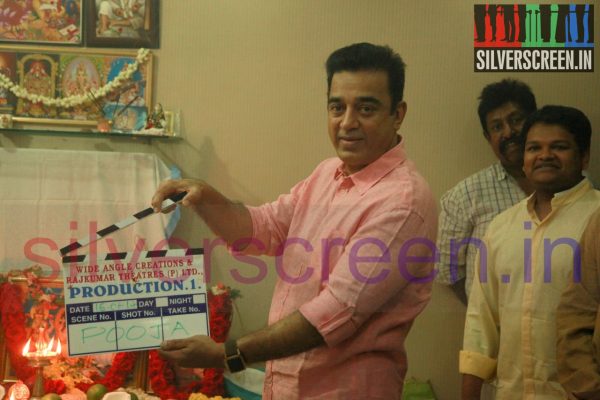
Actor Kamal Haasan and Music Director M Ghibran at Drishyam Remake Pooja Function
After listening to the song, Kamal had sent his assistant to buy the music album of Vaagai Sooda Vaa. He then played the tracks to Andrea, Pooja Kumar and the whole Viswaroopam team.
Soon Ghibran became a part of the movie.
Even today, he doesn’t know why Kamal chose him. The actor has never mentioned it. However, he has noticed Kamal Haasan hum his song sometimes. Especially Thanjavur Maadathi from Vaagai Sooda Vaa.
“Every composing session with Kamal Haasan is great,” he says. “For Viswaroopam II, we have used modern, orchestral and electronic music. For Uttama Villain, we have explored folk music since the film is set in 18th century. And when I talk to him, I learn so much. When he talks about a song, there is history, a futuristic vision, and he manages to link it all to the present. It’s a beautiful process and it happens only with him.”
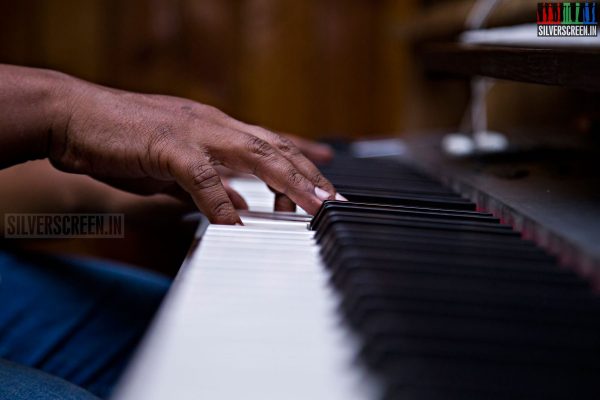
Music Director M Ghibran Exclusive HQ Photos for Silverscreen.in
His family soon moved to Chennai, amidst growing financial troubles, and Ghibran wrote his 10th board exams from home. Though they couldn’t afford his music lessons, he continued to learn piano, and worked some odd jobs. “I was selling lottery tickets for about two years,” he remembers.
He completed his fifth grade in piano when he turned 17, and he was able to conduct lessons himself. Ghibran also vaguely remembers a stint as a composer in a software company that made animation films. And it was a while before he settled down in Chennai, having set up a home studio to compose music for ad films. “I was among the very few who had a home-studio then. Nobody believed we could do that in 400 sq ft.”
Singapore happened later, and he met his scientist wife there. And, according to Ghibran, she is the only one who would listen as he scored music.The rest of his family gets to listen only after the launch.“Sometimes, if I am excited about a song, I would run home to play a song to her. But she would be fast asleep. Thookam varudhu, nalaiku kekaren nu solluvanga,” he laughs.
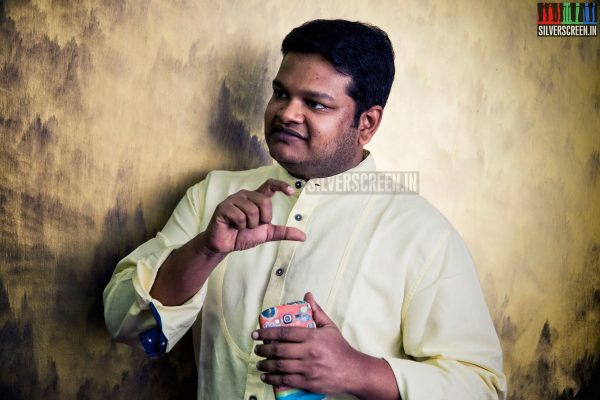
Music Director M Ghibran Exclusive HQ Photos for Silverscreen.in
When he isn’t scoring music, Ghibran listens to different types of compositions. He is now hooked to Yaarumilla from AR Rahman’s Kaaviya Thalaivan. He also loves listening to and arranging instrumental music, and his albums always carry karaoke tracks of his songs. “Someone texted me the other day saying their favourite track is the karaoke of Deva Devadhai from Amara Kaaviyam. I like it too.”
There are also a few other things that Ghibran would like to do this year. Apart from scoring beautiful music, that is.
Losing weight tops the list.
“I want to be active and do a lot of exercise. During every release, I buy some new shirts because I don’t fit into the old ones. Shirts are very expensive, you know!” he chuckles.
Ghibran ends on a serious note. “Music is my only inspiration,” he declares, “There is no desire to experiment; no desperation to do things differently. Composing music is an emotional journey. And, I just go with the flow.”
Sara Sara song:
Thanjavur Madathi song:
Amara Kaaviyam releases tomorrow.
The Ghibran interview is a Silverscreen exclusive.
